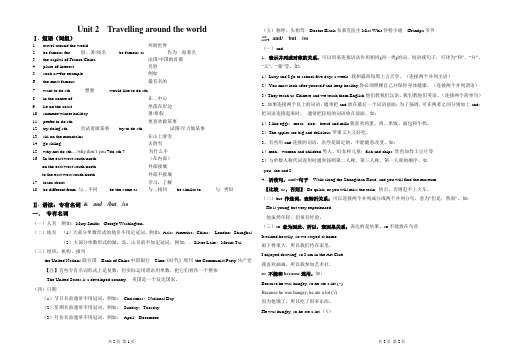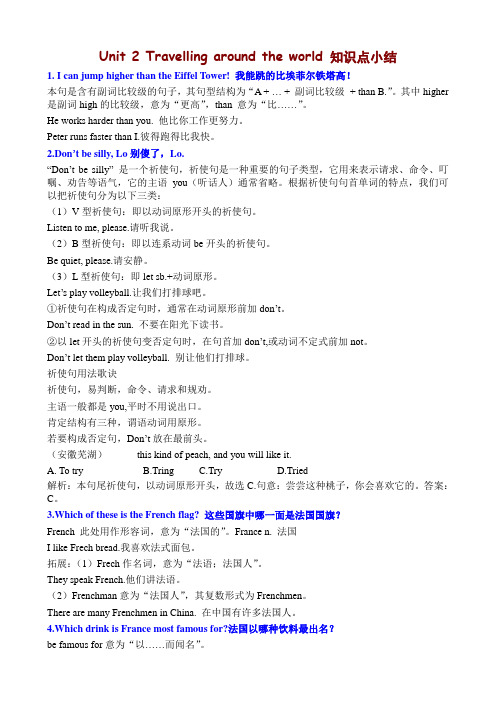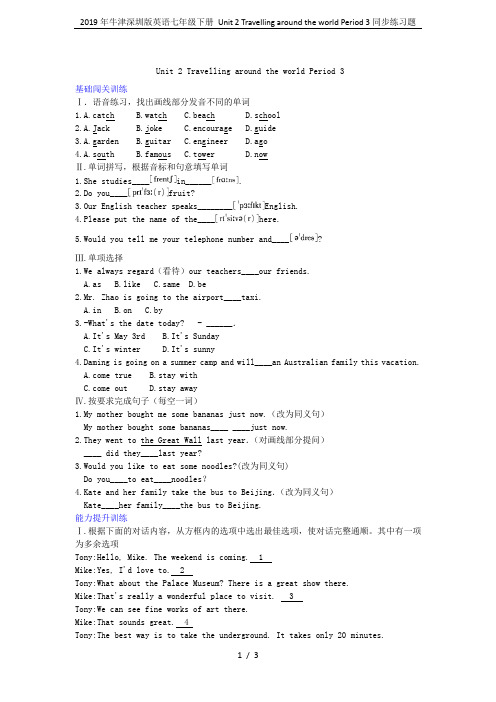深圳牛津版英语七年级下Unit 2 Travelling around the world 语法错误
深圳牛津英语七年级下册期末复习资料—知识点 unit2--Travelling around the world

Unit 2 Travelling around the worldⅠ. 短语(词组)1.travel around the world 环游世界2.be famous for 因…著/闻名be famous as 作为....而著名3.the capital of France/China 法国/中国的首都4.place of interest 名胜5.such as=for example 例如6.the most famous 最有名的7.want to do sth 想要would like to do sth.8.in the centre of 在…中心9.lie on the coast 坐落在岸边10.summer/winter holiday 暑/寒假11.prefer to do sth. 更喜欢做某事12.try doing sth. 尝试着做某事try to do sth. 试图/尽力做某事13.ski on the mountains 在山上滑雪14.go skiing 去滑雪15.why not do sth…/why don’t you +do sth ? 为什么不...16.In the east/west/south/north (在内部)on the east/west/south/north 外部接壤to the east/west/south/north 外部不接壤17.learn about 学习,了解18.be different from 与…不同be the same as 与…相同be similar to 与...类似Ⅱ. 语法:专有名词& and /but /so一.专有名词(一)人名例如:Mary Smith;George Washington。
(二)地名(1)大部分单数形式的地名不用定冠词。
例如:Asia;America;China;London;Shanghai (2)大部分单数形式的湖、岛、山名前不加定冠词。
(完整版)广州深圳新牛津版教材七年级下册Unit2知识点小结

Unit 2 Travelling around the world 知识点小结1. I can jump higher than the Eiffel Tower! 我能跳的比埃菲尔铁塔高!本句是含有副词比较级的句子,其句型结构为“A + … + 副词比较级+ than B.”。
其中higher 是副词high的比较级,意为“更高”,than 意为“比……”。
He works harder than you. 他比你工作更努力。
Peter runs faster than I.彼得跑得比我快。
2.Don’t be silly, Lo别傻了,Lo.“Don’t be silly”是一个祈使句,祈使句是一种重要的句子类型,它用来表示请求、命令、叮嘱、劝告等语气,它的主语you(听话人)通常省略。
根据祈使句句首单词的特点,我们可以把祈使句分为以下三类:(1)V型祈使句:即以动词原形开头的祈使句。
Listen to me, please.请听我说。
(2)B型祈使句:即以连系动词be开头的祈使句。
Be quiet, please.请安静。
(3)L型祈使句:即let sb.+动词原形。
Let’s play volleyball.让我们打排球吧。
①祈使句在构成否定句时,通常在动词原形前加don’t。
Don’t read in the sun. 不要在阳光下读书。
②以let开头的祈使句变否定句时,在句首加don’t,或动词不定式前加not。
Don’t let them play volleyball. 别让他们打排球。
祈使句用法歌诀祈使句,易判断,命令、请求和规劝。
主语一般都是you,平时不用说出口。
肯定结构有三种,谓语动词用原形。
若要构成否定句,Don’t放在最前头。
(安徽芜湖)______this kind of peach, and you will like it.A. To tryB.TringC.TryD.Tried解析:本句尾祈使句,以动词原形开头,故选C.句意:尝尝这种桃子,你会喜欢它的。
牛津深圳版英语七年级下册Unit2Travelling around the world第1课时课件

its wine.
10.France is a
European country.
谢谢观看
Thank you for watching
10.你对广州了解多少?
How much do you know
about Guangzhou?
11.我不知道他们在谈论什么。
I don’t know what they are talking
about .
12.法国在西欧。
France is in Western Europe .
13.北京是中国的首都。
Beijing is the
capital
14.露西非常喜欢滑雪。
Lucy likes
skiing
of China.
very much.
二、阅读理解。 Canada is the second largest country in the world.
Canada’s biggest bay (海湾) is Hudson Bay. Canada’s longest river is Mackenzie River in the Northwest. The highest mountain in Canada is the Mount Logan.
( D )3.What is Vancouver known for?
A.Castle buildings. B.The Summer Olympics in 2010. C.Beautiful sights. D.Outdoor sports.
( C )4.Which tourist attraction came into being in the last Ice
牛津深圳版英语七年级下册周周清3Unit2Travelling around the world课件

一、默写单词。
1.法国 n. France 2.法国的 adj. French 3.旗帜 n. flag 4.葡萄酒 n. wine 5.标记号,打上钩 v. tick
6.可能的 adj. possible 7.欧洲 n. Europe 8.(大型)百货商店 n. store 9.地址 n. address 10.优秀的 adj. excellent
It’s a good idea to visit this park during a festival.Every year it holds a Cherry Festival and an Indian Cultural Week.Then you can wander(漫 步)in the cherry garden, take photos and drink tea.It has many programs during holidays too.In summer holiday, the International Beer Festival is a big tourist attraction.The Pop Music Festival is the most popular with young people.It is held on China’s National Day.In December, Father Christmas welcomes the coming of the New Year, and then the World Dance and Singing Gala is held there during the Spring Festival.
the famous duck, Quanjude Restaurant is the best choice for you.The ducks here are the best in Beijing and the service is very good 5 .The ducks are kept in cages without moving around so that they will get 6 easily.Then the ducks are roasted (烤) in an oven (烤炉), or hung over the fire until they are done.After that, the cook 7 the duck into 120 pieces and serves the customer.It is not necessary (必要的) to order other soup, because your order has already 8 the duck-bone soup.
牛津深圳版七年级下英语Unit2 Travelling around the world教案

牛津深圳版七年级下英语Unit 2 Travelling around the world教案课题: Unit 2 Travelling around the world (阅读课)课时: 第 1 课时,共 4 课时课型:Reading教学目标:1. Students can get the main idea of the text.2. Students can talk something about France.3. Students’ interest about France can be developed.4. Students can master the language points of the text.(…with… such as … be famous for …5. Students can talk about France freely using the right sentence structure.6. Students can tell more information about France.教学重点: 1.Get the main idea of the text.2. Master the language points of the text.教学难点: 1.Retell the main information of France.2. How to use them to talk about France.教学准备: PPT, Blackboard教学步骤:Step 1.Warming up .Ask students to talk about France.1.Show some famous pictures of France for them to talk. Such as the Eiffel Tower ;the Louvre Museum ;the Champs-Elysees ;the French Alps2.Now let’s travel to France.Before we travel to France ,please finish Part A first.3.Check their answers.Step 2 ReadingBefore reading1.Ask student to look at the photos and the title of the article on Page17. Then answer the questions in 16 of Part B.2.Check their answer.3.Show the structure of the article for them.While reading1.Read Paragraph 1 and 2 to fill in the form. Check their answers.2. Read Paragraph 3 and 4 to answer some questions.Then check their answers.Post-readingFinish D2 after read the article.Then check their answers.Step 3 RetellingRetell the text, according to the key words(group work) .1. Practice retelling the text one by one in groups.2. Help them to review the key sentences or words and encourage them to retell the text. Step4 Reading comprehension.Read the passage and finish C1;C2;D2;D3(check the answers in groups)Step 5 Language points. Self- study.①Read the text to find the important sentences .②Learn the learning sheet to finish the related exercise .③Group work to share the learning result and help to solve the different points.④show the learning result by groups.Step 6 Using the language points.(games :lucky member)Step 7 DiscussionSolve the problems given by the teacher to earn marks for their group.Step8 Sum upSummarize the language points and group work resultStep9 HomeworkStep 10 The blackboard designbe famous for 以…闻名by the sea 在海边prefer to 更喜欢why not +动词原形=why don’t you +动词原形?为何不做某事?课题: Unit 2 Travelling around the world (听说课)课时:第 2 课时,共 4 课时课型: Listening & Speaking教学目标:1. Students can listen to figure out the key words to finish the passage2. Students can talk about their holiday plan.3. The interest of listening and speaking is developed.教学重点: Listening material about he Eiffel Tower.教学难点: Talk about the plans.教学准备: PPT, Blackboard教学步骤:Step1.Lead in .Enjoy the picture of the Eiffel Tower and talk about it .Step 2 Listening.Material about the Eiffel Tower.before listeningRead to guess the required information(numbers people and why..) . While listeningListen to tape and finish the notes.After listeningAct to be a reporter to report the Eiffel Tower.Step3 Speaking1.Talk about holiday plans (Task –learning )①Discuss to list the questions and answers about holiday plans in groups .②show the dialogue about holiday plans in pairs.2.继续学习音标1)Ask students to read after the teacher or the tape.2) Ask some students to read them aloud.Step 4 Games competitionMy holiday plansTalk about m y holiday plans according to the picture. (I would like to go… Because I’d like to…)Step 5: Writing1. Write out your favorite holiday plan.2. Encourage them to write out their plan by some hints.Step 6 HomeworkStep 7 The blackboard designUnit 2 Travelling around the world1.基数词的读法2.take the lift 乘坐电梯3.go shopping 去购物go sightseeing 去观光4. 音标课题: Unit 2 Travelling around the world (写作课)课时: 第 3 课时,共 4 课时课型: Writing教学目标:1.The students can use the proper expressions to describe a place.2.Their love of traveling around the world would be developed.教学重点: Teach them the ways to write about a famous place.教学难点: Using the proper words and structures to describe a place.教学准备: PPT, Blackboard教学步骤:Step1Warming upStep2 Reading1.Reading: the leaning tower of Pisa. P26.2.Introduce something about the leaning tower using some pictures.3.Read the article and answer the questions.4.Check their answers.Step2: writing1.Before writing: Ask students to think about1)What does a postcard include?2) How to write a postcard.2.While writing: Imitating.PartB You are a holiday. Write a postcard to a friend at home.1.Choose your favorite place of interest to describe.2.Help them to choose and describe their favorite place. Write their expressions and sentencestructures on the BB. Questions to help: Where, what, why…1)Lead them to write about their place using the proper Language and structure.2)Write the composition in 3 paragraphs. Where, what, why. Imitating the words and expressions on the BB.3)Lead them to write about their place using the proper Language and structure.3.After writing: Check with each other.1)Teach them how to evaluate a writing.2)exchange the writing in pairs to give remarks to each other .Step3 .Culture corner—BackpackingWork in groups to talk about Backpacking.Step 4 Project1.Ask students to work in groups to finish PartA then check their answers.2.Ask each group to choose a city from A and do some reach about it.3.PartC.Ask some groups to introduce the city to the class.Step5 DevelopmentHelp them to develop their work in words, sentence and structure.Step 6HomeworkRefer to P25 to write a postcard to your friend if you are traveling in your favorite place.Step7 The blackboard designUnit 2 Travelling around the world1.明信片的构成及写法。
2019年牛津深圳版英语七年级下册 Unit 2 Travelling around the wor

Unit 2 Travelling around the world Period 3基础闯关训练Ⅰ.语音练习,找出画线部分发音不同的单词1.A.catch B.watch C.beach D.school2.A.Jack B.joke C.encourage D.guide3.A.garden B.guitar C.engineer D.ago4.A.south B.famous C.tower D.nowⅡ.单词拼写,根据音标和句意填写单词1.She studies____in______.2.Do you____fruit?3.Our English teacher speaks________English.4.Please put the name of the____here.5.Would you tell me your telephone number and____?Ⅲ.单项选择1.We always regard(看待)our teachers____our friends.A.asB.likeC.sameD.be2.Mr. Zhao is going to the airport____taxi.A.inB.onC.by3.-What's the date today? - ______.A.It's May 3rdB.It's SundayC.It's winterD.It's sunny4.Daming is going on a summer camp and will____an Australian family this vacation.e trueB.stay withe outD.stay awayⅣ.按要求完成句子(每空一词)1.My mother bought me some bananas just now.(改为同义句)My mother bought some bananas____ ____just now.2.They went to the Great Wall last year.(对画线部分提问)____ did they____last year?3.Would you like to eat some noodles?(改为同义句)Do you____to eat____noodles?4.Kate and her family take the bus to Beijing.(改为同义句)Kate____her family____the bus to Beijing.能力提升训练Ⅰ.根据下面的对话内容,从方框内的选项中选出最佳选项,使对话完整通顺。
七年级英语下册 Unit 2 Travelling around the world课件 (新版)牛津深圳版
Unit 2 Travelling around the world
自主预习
一、根据汉语写出英文单词 1. 法国 (n.)_F_r_a_n_c_e__________ 2. 欧洲 (n.) _E_u_r_o_p_e__________ 3. (大型)百货商店 (n.) s_t_o_r_e____________ 4. 南方 (n.) _s_o_u_th____________ 5. 位于 (v.) _li_e______________ 6. 更喜欢 (v.) _p_r_e_fe_r___________ 7. 滑雪 (v.) _s_k_i _____________ 8. 完成 (v.) _fi_n_is_h____________ 9. 优秀的 (adj.) _e_x_c_e_ll_e_n_t ________ 10. 可能的 (adj.) _p_o_s_s_ib__le_________ 11. 法国的(adj.)_F_re_n__c_h__________ 12. 接受者(n.)_re_c_e_i_v_e_r_________
二、根据汉语写出下列词组 1. 以……而闻名 _(b_e_)__fa_m__o_u_s_f_o_r_______ 2. 更喜欢去做 _p_r_e_fe_r__to__d_o__________ 3. 去度假 _g_o_o_n__h_o_l_id_a_y_________ 4. 去观光 _g_o__s_ig_h_t_s_e_e_in__g_______ 5. 名胜 _p_la_c_e__o_f_in_t_e_r_e_s_t ______ 6. 尝试滑雪 _tr_y__s_k_ii_n_g____________ 7. 作为……而出名 _(b__e_)k_n_o_w__n_a_s_________ 8. 计划做…… _p_la_n__to__d_o_._..__________
新版深圳牛津英语 七年级下Unit 2Travelling around the world
Unit 2 Travelling around the world一、重要单词名词1、France 法国French (法语)speak \ in French2、flag 旗帜3、Europe 欧洲European adj欧洲的4、wine 葡萄酒5、store (大型百货商店)6、south 南部;南方7、coast 海岸;海滨 a place the land meets the sea8、tower 塔9、lift 电梯;升降机10、step 台阶11、stairs 楼梯12、receiver 接受者receive13、date 日期14、greeting 问候(名词复数greetings)v. greet15、address 地址形容词16、French 法国的17、possible 可能的possibly17、excellent 优秀的very good19、perfect 完美的动词20、tick 标记号;打上勾21、lie (过去式lay)位于;坐落在lie-lay-lies(躺,坐落),lie-lied-lies(说谎),lay-laid-lays (下单)22、prefer 更喜欢little…better23、ski 滑雪go skiing24、finish 完成end二、重要短语1.(be)famous for 以……而著名2.department store 百货商店3.prefer to do更喜欢做某事4.go on holiday 去度假5.go sightseeing 去观光6.western Europe 西欧7.the capital of …的省城8.place of interest 名胜古迹(复数)9.such as 比如10.be famous for 因为…而著名well-known11.in the center of 在…中心12.on the coast 在海岸线上,在海岸13.department store 百货商场14.prefer to do 更喜欢做某事15.try doing 尝试做某事(try to do)16.be close to 接近于17.be different from 不同于18.be far away from 远离…19.make grape vine酿造葡萄酒三、课文语言点(Keys:▲ Difficult points:★)1、Travelling around the world 重点(1)aroundprep:“围绕;在……周围”Eg:The earth goes around the sun 地球围绕太阳转adv :“大约,到处”Eg:The bag is around three kilos 这个包大约有三公斤2、The French flag 法国国旗▲(1)Frenchadj:法国的,法国人的,法语的Eg:Do you like French dishes?你喜欢法国菜吗?n:法语/法国人Eg:The villagers spoke French 村民们讲法语On my way home,I met a Frenchman 在回家的路上,我遇到了一个法国人3、Don' be silly别说傻话(1)sillyadj:糊涂的,没头脑的Eg:Oh,how silly you all are! 哦,你们都那么傻silly 常用句式:be silly to do sth = it's silly of sb to do sth 做某事是愚蠢的▲★Eg:You are silly to spend so much money on clothes= It's silly of you to spend so much money on clothes 你花那么多钱买衣服,真是愚蠢4.▲west n.西方Western “欧美的,西方的” eg. the Western countries 西方国家Western culture 西方文化eg. My house is in the western part of the town.[拓展] 词根-ern表示方位。
牛津深圳版英语七下Unit 2《Travelling around the world》(More
牛津深圳版英语七下Unit 2《Travelling around the world》(More pratice)说课稿一. 教材分析《牛津深圳版英语七下Unit 2》是一篇关于旅游主题的文章,通过描述不同地方的旅游景点和特色,让学生了解世界各地的文化和风土人情。
文章内容丰富,语言简练,贴近学生的生活实际,有助于激发学生的学习兴趣。
本节课的主要内容是学习文章中出现的生词、短语和句型,以及通过实践活动进一步巩固所学知识。
二. 学情分析七年级的学生已经具备了一定的英语基础,能够听、说、读、写简单的英语句子。
但是,对于一些旅游相关词汇和表达方式可能比较陌生,因此需要在教学中引导学生学习和掌握这些新知识。
此外,学生对于各地的旅游景点和特色可能了解不多,可以通过本节课的学习拓宽视野,增强对世界各地文化的认识。
三. 说教学目标1.知识目标:学生能够掌握文章中出现的旅游相关词汇和短语,如“tourist attraction”、“scenic spot”等;能够运用所学句型描述旅游景点和特色。
2.能力目标:学生能够听懂、会说、会读、会写关于旅游的简单句子;通过实践活动,提高学生运用英语进行交流的能力。
3.情感目标:激发学生学习英语的兴趣,培养学生的跨文化交际意识,拓宽视野。
四. 说教学重难点1.重点:旅游相关词汇和短语的掌握,以及句型的运用。
2.难点:对于一些旅游表达方式的运用,如“worth visiting”、“a placeworth visiting”等。
五. 说教学方法与手段本节课采用任务型教学法,通过引导学生参与各种实践活动,激发学生的学习兴趣,提高学生的学习积极性。
同时,运用多媒体教学手段,如图片、视频等,为学生提供丰富的视觉和听觉材料,帮助学生更好地理解和记忆所学知识。
六. 说教学过程1.导入:展示一些世界各地的旅游景点图片,引导学生谈论自己对这些景点的了解和感受,激发学生的学习兴趣。
2.新课导入:介绍文章的标题和作者,然后逐段讲解文章内容,引导学生学习和掌握旅游相关词汇和短语。
牛津深圳版英语七年级下册unit 2《travelling around the world》单元优秀教案(重点资料).doc
Unit 2 Travelling around the world一、教材分析本单元围绕着“旅游”为话题来展开听、说、读、写的训练。
通过阅读一份关于法国的旅游介绍,了解法国的城市风貌和著名景点,并初步了解介绍城市的方法。
介绍自己所在城市的名胜古迹。
为后面的语法学习作铺垫,同时在听说读写中引导学生掌握专有名词以及连词and,but and so的用法。
二、教学对象分析1.学生对于“旅游”比较熟悉,有利于开展本单元的各项听说读写任务。
2.学生对于专有名词以及连词and,but and so的用法的用法其实并不陌生,在小学和初一上学期已经接触过,只是没有进行专项的归纳性学习。
在本单元,教师可以系统地帮助学生温故而知新,引导学生在一定的语境中熟练运用专有名词以及连词and,but and so的用法三、单元教学目标1.认知目标21)能够在听、说、读、写等语言综合实践活动中运用本单元的重点词汇、句型与语法。
2)在学习中提高交流和传递信息的能力,在写作中句型使文章更连贯和流畅。
3)通过指导学生在模拟交际中运用所学的知识,培养学生探究学习、合作学习、自主学习的能力。
四、单元教学重点1.学生熟练掌握重点词汇24,短语5个2.指导学生利用所学句型正确表达思想、进行交际活动。
3.指导学生归纳专有名词以及连词and,but and so的用法并在实践中熟练运用它们。
五、单元教学重点1. 通过形式多样的课堂活动与任务,帮助学生完成阅读理解、听力理解等学习任务。
2. 引导学生积极主动地探究学习,从教材以外的渠道去了解与本单元主题相关的文化背景信息、资料等,并且与同学进行相互交流,顺利开展包括口头汇报、写作展示等拓展活动,培养学生探究学习、自主学习、合作学习的能力。
六、教学策略1.在教学中,教师应积极设情景引入,配合媒体、表情、动作、进行视听说演示,激发学生兴趣。
2.教师应采用有利于学生学习的教学方法,善于引用学生通过阅读或观察、比较对比知识进行归纳总结。
- 1、下载文档前请自行甄别文档内容的完整性,平台不提供额外的编辑、内容补充、找答案等附加服务。
- 2、"仅部分预览"的文档,不可在线预览部分如存在完整性等问题,可反馈申请退款(可完整预览的文档不适用该条件!)。
- 3、如文档侵犯您的权益,请联系客服反馈,我们会尽快为您处理(人工客服工作时间:9:00-18:30)。
Unit2 Travelling around the worldPart 1、本单元重要单词和词组练习单词:1) 名词:France, flag, Europe, wine, store, south, coast, tower, lift, step, stairs, receiver, date,greeting, address2) 形容词:French,possible, excellent, perfect3) 动词:tick, lie, prefer, ski , finish短语:Western Europe the capital of …. place of interest such as be famous foron the coast go sightseeing department store prefer to go on holiday try doing Exercise 1(A)根据提示写单词1. Spain lies in the s_______ of Europe.2. She bought a necklace from that department s________ yesterday.3. In winter, you can try s___________ on the mountains in the French Alps.4. She is f ________as a singer.5. I p________ to go to Hainan for this winter holiday.6. The t ______________is fifty feet in height.7. The farm grows various kinds of crops, s________ as wheat , corn, cotton and rice.(B) 选出可以替换划线部分的选项1. Liming is an excellent student in my classA .a very boring B. a very lazy C. a very happy D. a very good2. Uncle John lives on the coast.A. close to the seaB. far away from the seaC. close to the waterD. on the island3.I had a good time during the summer holiday.A. enjoyed myselfB. had free timeC. felt badD. was busy4 . France is famous for its fine food.A. learnedB. well-knowC. growD. sold5 Kitty enjoys making snowballs in winter.A. lovesB. hatesC. chooseD. wouldPart 2 课文重要句型1. France is in Western Europe, it’s a country with many beautiful places.① Western Europe 可以指西欧或西欧各国Western 是形容词,表示西部的,西方的拓展1:--ern 是表示方位的词根eastern(东部的), southern(南部的), northern(北部的)例:Shenzhen is in the southern part of China.拓展2:southeast 东南方southwest 西南方northeast东北方northwest 西北方②with 介词,此处表伴随, ‘拥有’的意思例如:Tom went into the teacher’s office, with his exercise books in his hand.造句:Rose 下午回家时,双手和衣服全是脏的。
_____________________________________________________2. Here you will find many famous places of interest such as the Eiffel Tower.① such as 例如, 比如; 意思同for example用法区别:such as 一般用于列举实物,后面一般接名词或名词词组,而且不用逗号隔开。
for example 一般用于举例说明,后面一般接句子,用逗号隔开。
例:I have lots of friends such as Lily, Lucy, Tom and Tony.Water is useful . For example, it can be used for drinking and bathing.② famous, 著名的,出名的,比较级:more famous, 最高级most famous词组:be famous for 因…而出名Egypt is famous for its pyramids.be famous as 以….身份出名Anne is famous as a writer.3. farmers grow grapes to make excellent French wine.① excellent= very good, wonderfulbe excellent at/ in sth, 表示在某方面很优秀②make wine 酿造葡萄酒有make 构成的短语:be made by sb. ____________ be made of sth. ____________be made from sth. ____________ be made into sth ____________be made in ____________4 The south of France lies on the coast, and it is famous for its wonderful beaches.on the coast 在海岸线上by the sea 在海边by the river 在河边口诀:规则说谎,不规则躺,躺过下蛋,下蛋不规则例句:Don’t lie to your friend, or you can’t remain friends.Paris lies on the siren river in France.A duck laid eggs under a tree.例题:The cook _____ that the eggs _____ on the table was _____ by him.A. lied; laid; layB. lied; lying; laidC. lay; laid; layingD. lay; lying; laid4. If you prefer to visit France in winter, you can try skiing on the mountain of French Alps① prefer to do sth= like to do sth better 更喜欢做某事He prefers to walk in the rain.拓展:prefer 的其他用法1)prefer +名词/V-ing例:Do you prefer meat or fish?I prefer skiing.2) prefer A to B 喜欢A胜过B ( A, B 可以是名词或者动名词)I prefer dogs to cats.I prefer staying at home to going out.② try doing sth 尝试着做某事Why not try going there by boat?5. Why not visit France this year?Why not do sth….? 这一句型用来提建议造句:为什么不在晚饭后去散步呢?___________________________________________拓展:表示建议的表达有:1) Why not do sth ? / Why don’t you do …?2) What/how about doing sth?3) Would you like to ….?4) Shall I / we do…..5) Let’s do …..6) You’d better do ….随堂练习:一)根据单词的正确形式填空1. Dalian is a city _________the coastA. toB. nearC. on2. Why not try ________your homework by yourself?A. finishB. finshiesC. fishinging3. Argentina ________football all over the world.A .is famous as B. is interested in C. is known to D .is famous for4. ________go fishing with me this afternoon?---Sorry. I don’t feel like doing that.A. How aboutB. Why don’tC. What aboutD. Why not5. What do you prefer, ____or ____?A. meat , vegetableB. meats, vegetablesC. meat , vegetablesD. meats, vegetable6.---Didn’t you have a picnic yesterday?---No, we didn’t . It rained heavily, _____we didn’t go out.A .but B. so C. though D. because7. There is a watch _______on the floor .A. lyingB. layingC. liesD. lays8.Study hard, ______you will fail in the exam.A. andB. butC. orD. so9. Study hard, _______you will pass the exam.A. andB. butC. orD. so10.---what’s your plan _____the weekend?---I’m planning ________swimming and shopping.A. to, goingB. of , goingC. for , to goD. in , to go一.名词的分类个体名词student,book可数名词普通名词集体名词:people, cattle, police名词不可数名词物质名词:water, rice, milk专有名词:China抽象名词:sorrow , pain, spirit二.名词的语法功能:在句中做主语,宾语,表语,定语等,不能做谓语考点1 : a lot of = lots of , many, some, few, a few修饰可数名词how many+ 可数名词复数考点2:名词做定语构成复合名词:一般名词修饰另一个名词时,只将后面的名词变成复数,如:girl students①I am hungry now. Please give me ________A. two turkey sandwichesB. three turkeys sandwichC. two turkeys sandwichesD. three turkey sandwich例外:‘woman, man’ 修饰名词时,要根据被修饰名词的单复数相应的变化。
